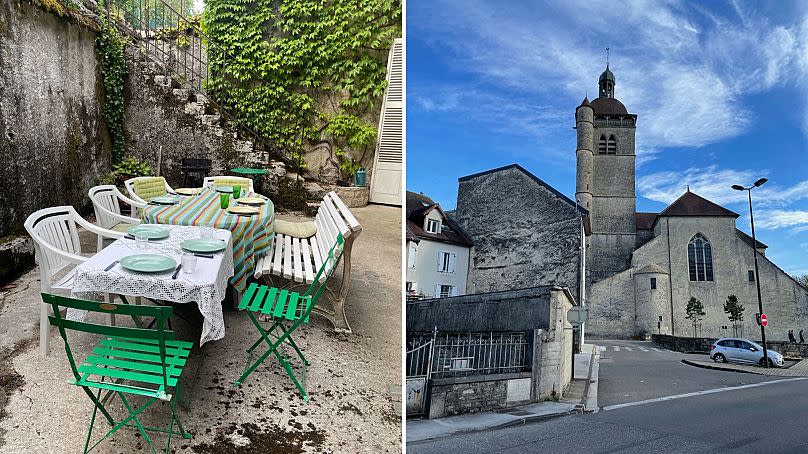Why I’m racing to get my French citizenship before the EU’s Entry/Exit System launches in October

As a dual-nationality family with a second home in Jura, France, we’ve seen our share of LeShuttle delays. The infamous day in 2019 when extreme heat caused a meltdown, and class war almost broke out in the car park. The queues backed up onto the M20 at half terms. The time we had to jump ship, and go on the ferry.
So it was with some horror that I learned of the EES - the European Entry/Exit System - which will be introduced in October this year. Brexit has already increased travel times due to the need to get passports stamped. The EES will replace that system, and require Brits to have data, including fingerprints and facial scans, recorded before crossing the border to the EU.
What do the changes mean for British nationals travelling to France?
What this means in practice is that anyone with a British passport travelling via LeShuttle - as well as Eurostar, airports and ferry terminals such as the Port of Dover - could face delays, especially as the scheme gets underway.
Anyone who’s travelled through the LeShuttle terminal recently will have noticed a lot of building work. This has been to prepare an area where British (and other non-EU) nationals will be diverted to in order to pre-register details at new biometric kiosks.
EU nationals - in my case, my husband Fred, 48, and teenagers Inès, 17, and Vincent, 15 - can pass through registration and passport control as normal. As the only person without a French passport, I will be letting the side down.
The whole family will have to divert to the pre-registration area, and twiddle their thumbs while I get out of the car to provide my biometric details at a kiosk. This will be most time-consuming on my first visit to Europe after the EES comes into force. I’ll have to provide my car registration, passport details, fingerprints and facial scan, with data valid for three years.
On subsequent trips only one piece of biometric information will be checked, but we’ll still have to do this in pre-registration areas in both the Folkestone and Calais terminals.

How has LeShuttle prepared for the change?
To be fair on LeShuttle, the car train service has planned ahead, investing over £67 million (€78m) to counteract delays. With Brits making up over 70 per cent of customers, this investment is a no-brainer. There will be 224 kiosks in total in the Folkestone and Calais terminals, and volunteer testing is taking place.
It’s claimed over 500 cars will be able to be processed an hour - based on an average three passengers per car - which will add only five to seven minutes to the journey. At peak times, up to four trains run, with 120 cars per train.
“We’ve been working on this for more than two years, and are lucky not to have the severe space restrictions of other international ports and terminals, so we’re confident the effect on customers will be minimal,” says COO of LeShuttle, Deborah Merrens.
European airports say FaceBoarding will cut security waiting times but is it mandatory?
How exactly will the EU’s new Entry/Exit System work? All your questions answered
Full marks to them for anticipating the change. But the new rules will still leave me in the doghouse with the teenagers - especially as there are signs that not everyone is as prepared as LeShuttle. The EU has admitted the European Travel Information and Authorisation System (ETIAS) which will work in conjunction with the EES has been pushed back to May 2025.
Meanwhile, Eurostar - with space at a premium in both London and Paris - is investing around €10 million.
“We have been working proactively on projections to accurately assess our needs across all stations,” a spokesperson tells EuroNews Travel. “As a result, we plan to install around 65 pre-check-in kiosks in our terminals at St Pancras in London and Gare du Nord in Paris.
“We are also significantly reinforcing border control capacity with additional manual booths and electronic gates at both stations.”
Why the EES will make it harder to break the 90-day rule
But there’s no getting away from it: travel will be easier for me and my family if I apply for French citizenship, which I’m entitled to as we have been married more than four years.
I’ll experience fewer delays travelling in and out of Brexit island if I can skip pre-registration and nip into the EU passport queue along with them at airports and terminals. Plus, as a fully-fledged French citizen, I won’t be subject to the 90-day rule (non-EU nationals can only stay in the Schengen area for a maximum of 90 days out of 180).
It would be surprisingly easy as a freelancer travel writer and second home owner like me to fall foul of this rule. The EES is designed to make it easier to check travellers haven’t overstayed their welcome, as it will record the date of entry and exit. Currently, this is monitored manually by border guards who check the date of passport stamps.

Parlez-vous Français: How easy is it to get French citizenship?
I realise I’m one of the lucky ones to be able to apply for EU citizenship, but there are hurdles to get over first.
My heart sank when I checked the application process. Friends had told us the level of French required to pass the language-speaking test was fairly low. But it’s recently been increased to ‘B1’, or an intermediate ‘independent speaker’.
Despite being with my husband for over 20 years, my accent is bad and I’m worried my spoken French will let me down, so I’m adding 30 minutes of French study to my daily routine.
I also need to find my parents’ birth certificates, which date back to 1931 and are hiding somewhere in my sister’s house. Once those are located, my husband will have to get our Livret de famille - the family book - updated to include details of our marriage. Then, and only then, can I do battle with the French consulate.
But with the threat of furious teens in the back of the car, the pressure is definitely on to get it sorted, and ideally by October. Otherwise I may be evicted from the family car and forced to travel to the EU by myself in future.

